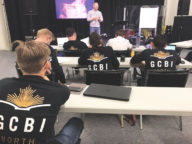“How long O Lord?”
This is an attitude with which we are all crying out, I’m sure. We so badly want this pandemic to be over, and who can be blamed for that? It’s absolutely exhausting with the constant changing of the rules, the fear of catching COVID, not being able to see friends, our church activities limited; it’s time for the madness to end!
It’s time for our normal lives to resume. We want to be able to gather again, to go to conferences, and to hug our grandparents and family. But what do we truly want or need at the end of this pandemic?
I think we desperately need to fight for unity while cultivating true community. Let me explain.
Striving for unity
God yearns for the unity of his people. Think about that long and hard. Of all the things Jesus prayed for on the night he was arrested, he prayed for unity amongst the people of God. Why wouldn’t he have prayed for the end of world hunger, or the defeat of Satan, or for the mighty spread of the gospel, or for the people to see God’s glory even during the horrible events that are about to take place in the crucifixion?
He didn’t pray for those things; he prayed for unity. “Holy Father,” he prayed, “keep them in your name, which you have given me, that they may be one, even as we are one” (John 17:11b). Further, “The glory that you have given me I have given to them, that they may be one even as we are one, I in them and you in me, that they may become perfectly one, so that the world may know that you sent me and loved them even as you loved me” (John 17:22-23).
This past year has been a brutal year for the church––both in Canada and worldwide. Conspiracy theories, racial tensions, and the American election, among other things, have divided the collective church like I have never seen before. Beloved Christian friends on Facebook have posted things that have made me think lower of them, which, of course, is not the right attitude. The beliefs of individual people do not change anything about them as a human being, a person made in the image of God, and who needs to be respected.
I have had to work hard not to “unfriend” beloved Christian friends on Facebook because of things they have shared.
A few months back, when Pastor James Coates was arrested and his church completely shut down by the Alberta Ministry of Health, I took to Facebook to declare the “correct” view of the situation, with the hope that people would calm down and realize that it is not an issue of persecution. In my mind, he and his church were blatantly breaking health orders, and were not being persecuted. I don’t think I was wrong in what I wrote, but I certainly had a negative tone. It was more self-righteous than helpful. There was a lot of backlash from my Facebook friends, mainly as a result of my post’s tone. The next day, I deleted the post, and apologized for my negativity, and self-righteousness.
It has been too easy to post things angrily, thinking that people will change their thinking as a result of my angry self-righteousness. How could people think this way?, I reason. Of course posts such as these are not helpful, and I realize, if I want to be a bridge builder, that I need to be much more gracious in my approach. I can hold to my opinions, but I need to reach out to other believers with a branch of humility, gentleness, patience, and love. This is from Paul’s list of attributes in Ephesians 4, which leads toward Christian unity.
It is honestly hard work to strive for unity, despite theological differences. There are the core beliefs of course, but there are so many secondary and tertiary issues and topics, including one’s views on the pandemic and the vaccine. Even within the church, it is easier to clump together into our various theological tribes. So easily, then, it can turn into an “us versus them” mentality, rather than “us together with them.”
I know from experience that unity is hard work. I care deeply about correct doctrine, and I want to keep championing it. But as the years have gone by, I have shifted in certain areas of my personal doctrine. From this proclivity comes the tendency to disassociate from certain individuals, and there are particular individuals, fellow believers, whom I do not wish to be associated with on a professional level because of their theological beliefs. Exactly that attitude, though, goes against what I’m getting at, and betrays my scriptural conviction of Christian unity.
So easily, then, it can turn into an “us versus them” mentality, rather than “us together with them.”
Who cares if I associate myself on a personal and professional level with people––members of my local church and Christian friends and family––who think differently on certain issues than I do? This is not to downplay the hard work that has gone into the development of doctrinal identity throughout the centuries, but, nonetheless, as Paul wrote in Ephesians 4:4-6, “There is one body and one Spirit—just as you were called to the one hope that belongs to your call—one Lord, one faith, one baptism, one God and Father of all, who is over all and through all and in all.”
Cultivating community
Included in striving for unity is cultivating community, specifically in the context of a local church gathering (though Christian friends and family not part of one’s local church are not excluded from this as well). Are we as the fellowship of God’s people the church, or, on a Sunday morning, do we go to church? The distinction matters, and the answer to that question is vital.
Usually, the attitude about going to church is to simply hear a sermon. But “church” is more than a sermon. Church is more than music. Church is more than the bad coffee in the foyer on the way in. The church is the new creation community of God’s people, who are striving for unity, and in whom God dwells.
This is about doing life together. When the time comes again for us to gather as a church family, will we sit and eat meals together? Will we laugh together again? Will we share our pain and sorrow together again? Online “church” is pseudo-community; that is, it is not quite true community. It does the job for Sunday worship, but it doesn’t replace sitting together at a meal, digging into the layers of food on one’s plate at a potluck, sharing and visiting about the week, and talking about the recent hockey game or politics.
The church is the new creation community of God’s people, who are striving for unity, and in whom God dwells.
Some of my favourite church experiences have been at summer Bible camp, though not actually with the campers and staff—but of course I enjoyed those times as well––just in case my former camp director is reading this! During the summer season, the sponsoring churches would gather together on Sunday morning in the camp chapel for Sunday morning worship. It was truly a joyful meeting together with these people, to worship together, and to hear one of the pastors preach. They were not my regular church family, they were not part of my denomination, nor was the preacher my pastor. But I felt a deep bond with them all.
Nothing could compare to sitting out in the sun on the picnic tables with a loaded plate at the potluck lunch, visiting with friends, saying hi, and talking about camp. I know for a fact that there was not 100% theological agreement amongst everyone there. But we did share a lot more in common, which is what brought us together. The camaraderie that we shared was comparable to a heavenly feast. Those times made me long for new creation with this family of believers. I didn’t care about our disagreements, because I wanted to share in the sweetness of unity!
As Dietrich Bonhoeffer wrote in Life Together, “The physical presence of other Christians is a source of incomparable joy and strength to the believer.”
What’s next?
This past year has been difficult, to say the least, and I am ready for it to be over. When I cry out, “How long, oh Lord?,” what am I truly longing for? Am I truly longing, yearning, and desiring God’s new creation? Is longing for the pandemic to end also combined with a longing to strive for unity, and a cultivation of true and lasting community?
A key step in this process comes from James 1:19: “Let every person be quick to hear, slow to speak, slow to anger.” Take the time to realize that other people hold tightly to their beliefs, and learn the reason for that. People appreciate when others care to know, and listen to their beliefs and the journey they have been on to formulate their thoughts and opinions. Nobody likes being looked down upon and lectured about what is right and wrong. We likely won’t change minds through angry, pride-filled rhetoric. Striving for unity comes when we begin to have respectful conversations with each other, in which we search together for the core unifying ideas that bring each of us together as Christians.
Here’s an idea: Get off of social media, and go talk to a real person––maybe even somebody you disagree with!
This means thinking of other Christian family and friends as equals in Christ, even though they may have ideas that we believe are wrong. Remember what Jesus taught his followers: people will know that we are his disciples by our love for one another.
So then, the first step is an attitude change: a change from negativity about our Christian brothers and sisters, toward an attitude of acceptance, love, and tolerance despite doctrinal differences. It may not be easy, that’s for sure; thinking less of ourselves and our opinions does not come naturally. Thank God we have the Holy Spirit to guide us and to unify us. We have God’s grace to try again when we fail over and over again to be respectful in our minds, in our words, and in our actions.
We cannot let this pandemic tear us apart. We cannot let everything that has happened define who we are as a community of God’s people. I truly hope and pray that God’s good can take place in the midst of darkness and division. We need each other, and it’s time we stop fighting and come together. Let’s get our hands dirty, put in the hard work, the long hours, and the sweat, and tears, to bring together the church according to God’s blueprint.
"*" indicates required fields
Share this!
About the Author





